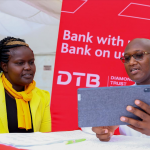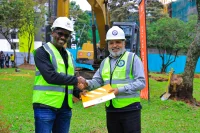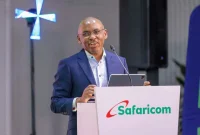Transport Cabinet Secretary Kipchumba Murkomen has made public the original contract signed between Kenyan authorities and China for the construction of the Standard Gauge Railway (SGR). The deal was signed by former Treasury Cabinet Secretary Henry Rotich and Exim Bank of China President Li Ruogu.
The Kenya Kwanza coalition had promised to make the contract public, after the previous administration refused calls to do so, and disobeyed an order by Justice John Mativo to make the contract public. The previous administration led by President Uhuru Kenyatta cited confidentiality clauses in the agreement, and the possible injuring of relations with China.
Murkomen shared with newsrooms the contract seen by Business Today. Questions, however, remain on whether Murkomen left out key parts of the deal. The documents fail to reveal any information on the collateral Kenya put up for the project – previously reported to be the Kenya Ports Authority (KPA) and its assets including the Port of Mombasa.
Whether it satisfies the order issued by Justice Mativo in May remains to be seen, as activists Khelef Khalifa and Wanjiru Gikonyo had sought to have all contracts, agreements and studies related to the construction and operations of the SGR made public – including information on the collateral put up by Kenya. The Exim Bank of China signed with Kenya three agreements as part of the $3.6 billion (Ksh437 billion) loan for construction of SGR.
The contract shared by CS Murkomen does, however, offer insight into the terms of the SGR deal:
- China was to lend Kenya $1.6 billion (Ksh190.77 billion) at 2 percent interest per annum, plus a 0.25 per cent commitment fee.
- It is a 20-year loan with a seven-year grace period.
- Kenya was to repay the amount in 13 years (156 months).
- Kenya was to dedicate 42.06 per cent of proceeds from the SGR to repay the loan from the Exim Bank of China.
- In case of a dispute, Kenya is bound to seek resolution only in China – handing China an upper hand should a major disagreement occur. Any disputes that can’t be solved via consultation can only be submitted to the China International Economic and Trade Arbitration Committee for arbitration.
- Kenya was bound to establish an inland container depot in Nairobi “and its mandatory customs clearance”.
- Kenya was also bound to establish a Railway Development Fund, “to be applied in priority to make repayment of loans in relation to the project”.
8. China was to be the preferred market for Kenya to source any goods it purchases using proceeds of SGR.
9. The agreement precludes Kenya from sharing its details without consent from Exim Bank of China, keeping contract details under wraps.
“The Borrower shall keep all the terms and conditions hereunder in connections with this Agreement strictly confidential. Without the prior written consent of the Lender, the Borrower shall not disclose any information hereunder or in connection with this Agreement to any third party unless required by applicable law,” it read in part.

![he previous administration led by former President Uhuru Kenyatta, pictured here with Xi Jinping, cited confidentiality clauses in the agreement, and the possible injuring of relations with China. [Photo/ CGTN]](https://businesstoday.co.ke/wp-content/uploads/2022/11/UK-1.png)

![The Kenya Airline Pilots Association (Kalpa) has maintained that pilots will withdraw their services until the management of Kenya Airways effectively addresses their concerns. [Photo/ Standard]](https://businesstoday.co.ke/wp-content/uploads/2022/11/dkxkzzgv7n32mxevwra602374a7da6a9-150x150.jpg)









Leave a comment